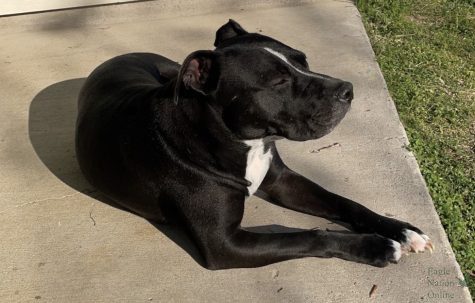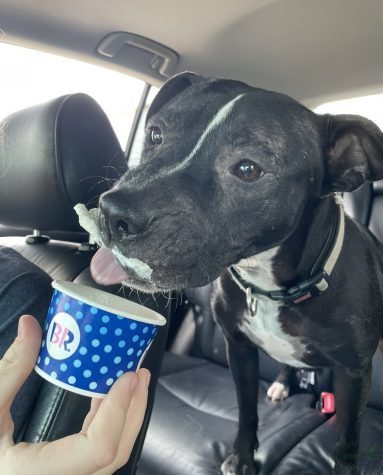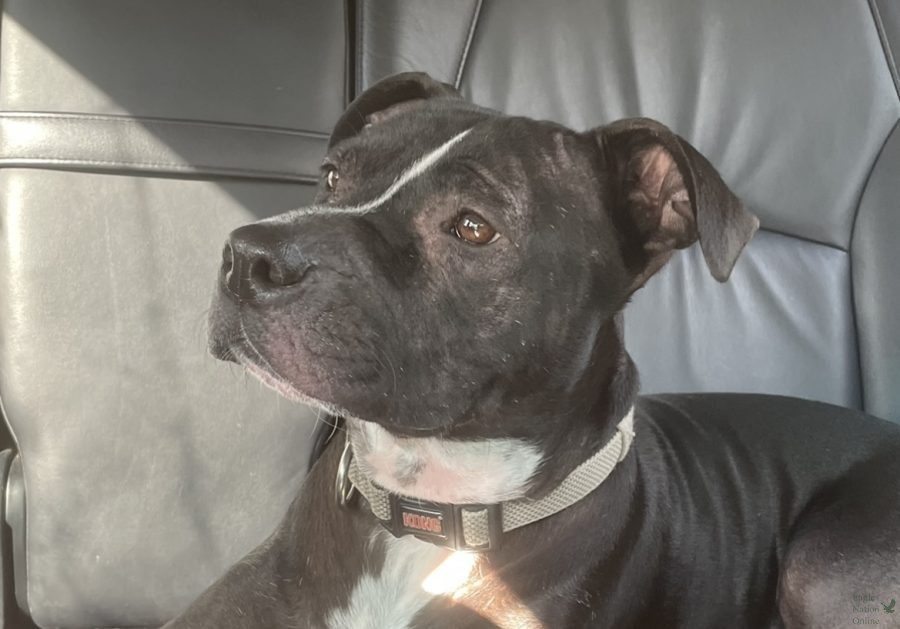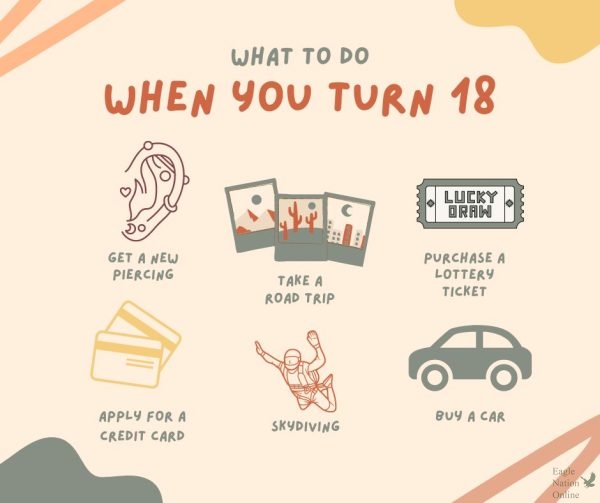Opinion: Pit Bulls aren’t dangerous, society’s mindset is
Writer Alyssa Clark looks to change mindset, stereotypes behind dog breed
Laying in the backseat of senior and writer Alyssa Clark’s car, Luna looks out the window. Luna is an American Bull Terrier, better known as a Pit Bull. “Pit Bulls aren’t dangerous,” Clark said. “But, the stereotype that’s been placed on them makes them seem so.”
Sharp teeth. Relentless, locking jaws. Powerful builds. All these stigma-inducing words are often used to describe “dangerous” dogs – and most of the time, Pit Bulls.
Pit Bulls aren’t dangerous, but the stereotypes surrounding them can be, and they could continue to enforce a consistent pattern of abuse and neglect for these dogs.
Pit Bulls are officially known as American Pit Bull Terriers. They were originally bred to “bait” bulls, but have come to be great family dogs and companions. They usually weigh anywhere from 30 to 85 pounds, and the name “Pit Bull” has been used as a mislabeling term for any kind of terrier. They’re playful, courageous, obedient and very smart.

If it wasn’t obvious already, I’m a proud Pit Bull lover, and my favorite dog in the world is my 3-year-old Pit Bull, Luna. I’ve written a column about her and her puppies before, as my family was fostering her over the pandemic, and she surprised us with pregnancy just a few days after we picked her up. With all that we had been through with her, we fell in love with her playfulness and sweet disposition. She’s smaller than the average Pit Bull, and we call her a “pocket pitty” because of her size.
Luna’s definitely a one-of-a-kind dog, but she represents a whole breed of dogs that have been turned away by society and labeled as “dangerous breeds” – completely misrepresented by a few bad accidents. We saved Luna from euthanasia, and it’s been the best decision our family has made. Since we adopted Luna, the shelter we saved her from has become a no-kill shelter.
Pit Bull euthanizations are more common than one may think. A study by Pawsomeadvice.com shows that 25% of Americans don’t like Pit Bulls, and 40% of these dogs are euthanized each year. With a population of about 4.5 million dogs, or 6% of the U.S. dog population, that means 1.8 million Pit Bulls are euthanized annually.

Pit Bulls have been commonly known as victims of abuse, and are often used as fighting dogs. Pet Pedia and PETA show that Pit Bulls are the most common dog fighting breed used, and one in four abused dogs are Pit Bulls. The saddest part is, none of the horror stories behind Pit Bull attacks is the dog’s fault: it’s all about the training and guidance from the owners. Pit Bulls seek to please, and when the owner has cruel intentions, the dog only knows that they’re following commands. This constant cycle of abuse and death will never be solved until restrictions and stigmas behind breeds like Pit Bulls are taken away.
Other sites, like the Keating Firm, a law firm that specializes in accidents, injuries and dog bites, ranked popular dog breeds on the pressure of their bite, and the Pit Bull came at 13 on a scale from one to 20. Their bite can go up to 235 PSI (pounds per square inch,) barely behind a German Shepherd by 3 PSI.
Pit Bull owners sometimes can’t even have an apartment or house with their furry friend. These “breed restrictions” are simply discrimination between black-listed breeds, compared to other intellectual and strong dogs, like a German Shepherd, who are sometimes used for more aggressive manners – such as finding criminals or drug-sniffing – but society will still always pick the K-9 breed.
Pit Bull incidents still happen, but you can’t blame a whole breed for the actions of one. That’s like blaming one human for all of mankind. Every dog breed is going to have outliers. There are still French Bulldogs or Labradors that are aggressive and bring harm to their owners. The Atlantic even wrote an article covering the temperament and behavior of Chihuahuas compared to bigger, labeled “more dangerous” breeds like Pit Bulls or Rottweilers.
Pit Bulls are surrounded by misconceptions, but there are people who don’t know about them. According to DogTime.com, 860 Pit Bulls were tested by the American Temperament Testing Society, and the breed had an 86% pass rate, while a much more popular “family-friendly” dog breed, Golden Retrievers, had an 85.2%. The test simulates a casual walk through a park or neighborhood where everyday-life situations are encountered. During this walk, the dog experiences visual, auditory and tactile stimuli. Neutral, friendly and threatening situations are encountered, calling into play the dog’s ability to distinguish between non-threatening situations and those calling for watchful and protective reactions. As quoted from the ATTS, the test used on these dogs “focuses on and measures different aspects of temperament such as stability, shyness, aggressiveness, and friendliness as well as the dog’s instinct for protectiveness towards its handler and/or self-preservation in the face of a threat.”
If someone is interested in how they can help raise awareness about the breed, adopt or foster a Pit Bull. There are many resources available. Kennel to Couch is a non-profit organization that teams with shelters and community partners to remove “at-risk” Pit Bulls from shelters and provide the support and incentives needed to encourage the adoption of their sponsored dogs. Across their page, they provide helpful facts and information, and they debunk myths behind the Pit Bull breed. Also, The Love Pit is a Dallas foster-based rescue shelter that has saved over 1,100 Pit Bull lives, and it is a great source if someone is looking to donate, adopt or foster.
Pit Bulls are only one of these special breeds that have been turned away by society. The list of breeds that have been blocked by insurance are names you’ve probably seen before: Pit Bull Terriers, Staffordshire Terriers, Rottweilers, German Shepherds, Presa Canarios, Chows Chows, Doberman Pinschers, Akitas, Wolf-hybrids, Mastiffs, Cane Corsos, Great Danes, Alaskan Malamutes and Siberian Huskies. All of these “black-listed” dogs deserve love before judgment.
Any dog can be violent. It’s time for society to start believing in these “dangerous” breeds and giving them a chance.
Your donation will support the student journalists of Prosper High School. Your contribution will allow us to purchase equipment and cover our annual website hosting costs.

Honors, Experience and Awards:
UIL Journalist, District Qualifier 2019 - 2022
Quill & Scroll Honor Society Member
2 TAJE Honorable Mentions in 2020, 2021
TAJE Best in Texas 2022 - Excellent - Podcast
TAJE Best in Texas 2022 - Honorable Mention - Podcast
TAJE Best in Texas 2022 - Excellent - Sports Column
TAJE Best in Texas 2022 - Excellent - Staff Editorial
ILPC Award Winner for Reviews and Video Packages
Previous Hope Squad Member, Former Social Media Director for ENO
8 Best of SNO Publications














jeff • Jul 19, 2022 at 8:12 am
I have 2 pit bulls one was a stray and the other was unwanted both are beautiful and loving dogs one male about 8 yrs old (stray) never barks loves everyone and the kittens love him always sleeping curled up with him. the other is a female 1.5 yrs old very active and very smart mothered the kittens when we found them in our garage very playful and also never barks loves other dogs and people great bread just like all the other breads you mentioned Roots , shepard’s, chows, i have owned all of them and never had anything but great personalities from them all